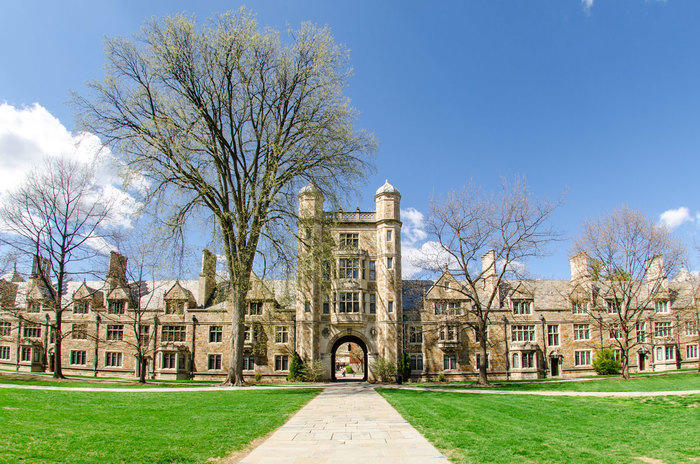Learn what it takes to get into the University of Michigan Law School.
See Acceptance Rates, Average LSAT Scores,
GPA & More
The University of Michigan Law School Overview
Established in 1859, the University of Michigan Law School is one of the oldest academic institutions dedicated to legal degrees in the entire country. While many people are familiar with the University of Michigan's successful sports programs, the law school attracts a lot of attention for its curriculum, faculty, and academic journals. As the best law school in Michigan and one of the top-ranked law programs in the nation, the University of Michigan Law School offers top-quality legal education to both domestic and international students.
Since its earliest days, the University of Michigan Law School has produced thousands of successful graduates. While not all Michigan alumni choose to become lawyers, the vast majority have entered the field of law as trial lawyers and legal experts. For example, Clarence Darrow studied at the University of Michigan Law School before becoming famous as a defense lawyer in the Leopold and Loeb murder trial, as well as the Scopes "Monkey" Trial.
In addition to their prestigious J.D. program, the University of Michigan Law School offers three distinct graduate degree programs:
- Master of Corporation Law (MACL)
- Master of Laws (LLM)
- Doctor of the Science of Law (SJD)
While the University of Michigan Law School offers flexibility within their degree programs, the Admissions Office strives to keep classes small. Most years, only a few dozen students are admitted to the graduate LLM program, and even fewer are accepted to the SJD program.
Despite the variety of courses, the University of Michigan Law School specializes in international law. Many of the school's student-led organizations, academic programs, and departmental initiatives center on legal studies outside of the United States. At the University of Michigan Law School, students can participate in the International Law Workshop and enter degree programs like European Legal Studies, Environmental Law & Policy, Chinese Legal Studies, Refugee & Asylum Law, and the Zell Entrepreneurship and Law Program.
Like many top law schools in the United States, the University of Michigan Law School is celebrated for its academic publications related to the latest legal news and research. The Michigan Law Review is one of the oldest legal journals in the country, and while it is the most well-known at the university, there are many publications for niche legal areas. For example, students and faculty at the University of Michigan Law School also publish the University of Michigan Journal of Law Reform, Michigan Journal of International Law, Michigan Journal of Gender & Law, Michigan Journal of Race & Law, Michigan Telecommunications and Technology Law Review, Michigan Journal of Environmental & Administrative Law, and the Michigan Business & Entrepreneurial Law Review.
Finally, the University of Michigan Law School is located in Ann Arbor, Michigan. While it may not have the same appeal as law schools in New York City or Chicago, Ann Arbor has a lot of small-town charm. It is a college town that revolves around the university's academic and sports programs. As a result, students from around the globe are more than happy to qualify for a spot at the University of Michigan Law School.
The University of Michigan Law School Rankings
School rankings are very important for prospective students in any discipline, but they are especially relevant for students of law. Law school rankings indicate the quality of education at each respective university. Additionally, rankings are often cited by employers and other academic institutions as a vital metric when evaluating a job candidate's eligibility. Every year, dozens of independent organizations and news outlets use raw data to determine which schools currently sit at the top of the list.
While rankings vary somewhat based on which organization is doing the research and which metrics are given the most weight, the top 10 law schools in the country tend to be the same across the board. As of 2019, the University of Michigan Law School generally falls at #8 on most lists, making it one of the best law schools in the nation.
The University of Michigan Law School Admissions
What Is The University of Michigan Law School Acceptance Rate?
Law school rankings also help determine how competitive a given law school will be for prospective students. In most cases, the higher a law school ranks, the harder it is to get accepted. However, a few other metrics, such as the "prestige" of the institution and type of academic programs offered can influence admissions rates as well.
The University of Michigan Law School admissions is extremely competitive, much like many of the top Ivy League law schools in the country. While the average national acceptance rate for law schools is around 45%, it is much more difficult to get accepted into the University of Michigan Law School. As of 2019, the University of Michigan Law School's acceptance rate sits at 27.98%. Though this is significantly lower than the national average, it is much higher than many of the top law schools in the nation, which have an average acceptance rate of just 21.10%.
Annual variations are important, but they are often dictated by forces outside of an individual student's or school's control. For example, the University of Michigan Law School (and any other law school) can only accommodate a certain number of students every year. In 2019, the University of Michigan Law School made offers to 1,213 of the 4,335 applicants. However, the acceptance rate would likely be much higher (as a percentage of the total) if there were fewer applicants in a given year.
In any case, there are still a number of standard metrics based on students' abilities that help determine a school's acceptance rate. Undergraduate GPA and LSAT scores are perhaps the two most important metrics, though various other aspects of each application are also considered. In 2019, the average undergraduate GPA among accepted applicants at the University of Michigan Law School was 3.76. This average is relatively low when compared with other top law schools, like Harvard (3.86) or Yale (3.93).
There was less variation among the average LSAT scores between schools. This year, the average LSAT score for incoming students at the University of Michigan Law School was 168, though both Harvard and Yale had slightly higher average scores among their incoming students (173). You can find more statistics on the University of Michigan Law School's admissions for the class of 2023 in the table below:
| Applications | Offers | Matriculated | |
| Class of 2023 | 4335 | 1213 (27.98%) | 267 (6.2%) |
| 25% | Median | 75% | |
| GPA | 3.54 | 3.76 | 3.87 |
| LSAT | 164 | 168 | 169 |
The University of Michigan Law School LSAT Percentiles
| 75th percentile | 169 |
| 50th percentile | 168 |
| 25th percentile | 164 |
Want to get into the University of Michigan Law School? Sign up for LSATMax today!
2019 Entering Class Profile
| Number of Students | 935 |
| LSAT Score | 168 |
| Undergraduate GPA | 3.76 |
| % Women | 47.7% |
| % Students of Color | 4.0% |
| % Enrolled Directly After College | N/A |
What Is The Tuition For the University of Michigan Law School?
| In-State Resident | Non-Resident | |
| Full Time | $53,112 | $56,112 |
| Part-Time | N/A | N/A |
What Are The Living Expenses At the University of Michigan Law School
| On-Campus | $18,550 |
| Off-Campus | $18,550 |
What Are The Housing Options At the University of Michigan Law School
| On-Campus | Yes |
| Off-Campus | Yes |
BAR Passage Rates At the University of Michigan Law School
| Reporting | 82.7% |
| First Time Takers | 353 |
| The University of Michigan Average | 93.2% |
| Michigan State Average | 76.3% |
| National Average | 54% |
Application Deadlines
When will the University of Michigan Law School application materials be available?
The University of Michigan makes the admissions application available to prospective students online. Additionally, since the University of Michigan Law School uses a rolling admissions process (applications are reviewed on a "first come, first served" basis), it is recommended that prospective students review and submit the application materials as early as possible. You can find the application materials at this link.
When does the University of Michigan Law School begin accepting applications?
The University of Michigan Law School begins accepting applications on September 1st. The deadline to submit your application for the upcoming fall semester is February 15th.
How are applications to the University of Michigan Law School submitted?
Like many other law schools, the University of Michigan Law School accepts applications online via the Law School Admission Council (LSAC) application. Applicants must follow a 9-step process in order to apply. The application process is outlined on the LSAC website.
Does the University of Michigan Law School have an "early admission" or an "early decision" process?
Yes, the University of Michigan Law School does allow applicants to choose an "early decision" option. The early decision application is binding, which means that if the applicant is accepted, they must commit to the University of Michigan. The deadline for early decision applications is November 15th. You can learn more about the early decision option right here.
How much is the application fee and when is the deadline?
| Application Fee | $75 |
| Early Decision Deadline | November 15th |
| Regular Decision Deadline | February 15th |
Does the University of Michigan Law School grant interviews?
While the admissions office will meet with applicants to answer questions, the University of Michigan Law School does not conduct evaluative interviews.
Employment After the University of Michigan Law School
| Median Salary Private Sector | $133,000 |
| Median Salary Public Sector | $65,000 |
As one of the top law schools in the nation, the University of Michigan Law School has produced thousands of successful graduates. Many alumni go on to become politicians, judges, entrepreneurs, and successful trial lawyers. While not every graduate at Michigan will work in law, the vast majority do. In any case, let's look at a few of the most recent job statistics for the University of Michigan Law School alumni:
- Employment Status — As of 2018, almost 98% of Michigan alumni found employment after graduation.
- Location — Unlike many other top-tier law schools, many graduates from the University of Michigan Law School find out-of-state employment. As of the latest data, approximately 24% of Michigan Law School alumni work in New York, 13% in Illinois, 12% in Michigan, 11% in California, and 10% in Washington D.C.
- Job Sector — The vast majority of Michigan Law School graduates go on to work in the private sector. Approximately 62% of graduates work at a law firm, 32% work in the public sector, and the remainder work for businesses, academia, or are self-employed.
- Salary — Law firm employees report the highest salaries by far, followed by business, and then the public sector (government) employees. Salaries for Michigan Law School students range from $56,000-$190,000.
Want to get into the University of Michigan Law School? Sign up for LSATMax today!












